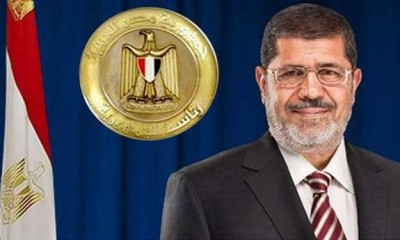Overthrown in a 2013 Military Coup, The Passing of Egypt’s Mohamed Morsi: Man vs. Myth

The passing of former Egyptian President Mohamed Morsi presents the perfect opportunity for reflecting on his controversial legacy and the real impact that this Muslim Brotherhood leader had on the region.
Former Egyptian President Mohamed Morsi passed away on Monday due to what are largely thought to have been health complications arising from his poorly treated blood pressure and diabetes while in custody. The country’s brief leader was overthrown in a 2013 military coup by now-President Sisi in response to rising protests against his rule driven by many of his secular compatriots who were extremely uncomfortable with a member of the previously and once-again banned Muslim Brotherhood as their head of state. Morsi narrowly won the presidency by less than a one million vote margin in a country of over 90 million people, so his mandate was always questionable and gave rise to rumors about its legitimacy.
Importantly, Morsi shared the same ideology as both the Qatari and Turkish leaders, so his rise to power provoked fears among some regional security stakeholders that a new axis of influence was forming in the Mideast, one that could threaten both the remaining secular governments and the monarchic ones as well, both of whom shared little in common other than their agreement that the Muslim Brotherhood is a terrorist organization. It’s due to this strategic consideration that many believe that the Gulf Kingdoms secretly played a role in Sisi’s 2013 coup, which led to the Brotherhood being banned once again and Morsi charged with a bevy of crimes that resulted in an overturned death sentence.
Supporters of the coup believe that it prevented the country from descending into civil war given the dangerous polarization that it entered into following the onset of the so-called “Arab Spring“. They also point to Morsi’s anti-Assad stance and believe that he was planning to play a leading role in the War of Terror on Syria had he not been stopped by the military. Critics of the coup, however, denounced it as a foreign-backed anti-democratic seizure of power that merely replicated the same Color Revolution tactics that brought Morsi himself into power in the first place. They’re also very unhappy with with Sisi’s presidency because they don’t see much of a difference between him and Mubarak.
Morsi’s alleged mistreatment and ultimate death in custody are also being interpreted by some as a message to Turkish President Erdogan of the fate that could befall him if he’s ever overthrown as well, such as what was unsuccessfully attempted during the summer 2016 coup events. The two leaders are ideological brothers-in-arms with a vision of Islamifying their decades-long officially secular societies, which Erdogan has already almost fully succeeded with whereas Morsi never really had much of a chance. Granted, there are serious differences between both societies that facilitated and impeded those leaders’ plans, but with Morsi out of the picture and Qatar largely “contained”, Erdogan’s Turkey is now the Muslim Brotherhood’s last main torchbearer.
Interestingly, although Russia officially regards the Muslim Brotherhood as a terrorist organization and wasn’t on good terms at all with Morsi, it nowadays has no problem with Erdogan and is actually in a fast-moving strategic partnership with his country. This seemingly contradictory stance can be explained by contemporary geopolitics and the prevailing fears around the time of the “Arab Spring”. Russian General Chief of Staff Valery Gerasimov wrote in February 2013 that Moscow regards the aforementioned events as a series of Color Revolutions that catalyzed regional conflicts, whereas President Putin just praised Turkey the other day during the SCO Summit in Bishkek for contributing to Russia and Iran’s joint victory over Daesh in Syria.
Quite clearly, Russia doesn’t consider Erdogan’s embrace of the Muslim Brotherhood to be as threatening as Morsi’s was, most likely because Turkey nowadays cooperates real closely with Russia in Syria after its geopolitical volte-face since the failed summer 2016 coup attempt while Egypt was supposedly getting ready militantly export its model to Syria and elsewhere in the region before Sisi’s successful 2013 coup. The thought exercise of comparing and contrasting Morsi’s Egypt with Erdogan’s Turkey therefore reveals that geopolitical calculi were the main reason why Russia eventually came to treat these two very ideologically similar states differently in spite of their nearly identical regional visions.
With this in mind and reflecting on the rest of Morsi’s legacy, most observers would agree that this fallen leader elicits very strong partisan political reactions from the average person, who either strongly supports him as the best of Egypt’s post-independence leaders or vehemently opposes him as its worst, believing that he embodied a brief period of hope or epitomized the chaos of the times, respectively. Some will insist that he was brought to power by the people and taken down by a foreign plot, while others maintain that his rise was due to a foreign-influenced Color Revolution and only ended with a patriotic coup. Whichever way one looks at it, the myth will always overshadow the man, for better or for worse, making Morsi’s legacy all the more contentious.
*
Note to readers: please click the share buttons above or below. Forward this article to your email lists. Crosspost on your blog site, internet forums. etc.
Andrew Korybko is an American Moscow-based political analyst specializing in the relationship between the US strategy in Afro-Eurasia, China’s One Belt One Road global vision of New Silk Road connectivity, and Hybrid Warfare. He is a frequent contributor to Global Research.

